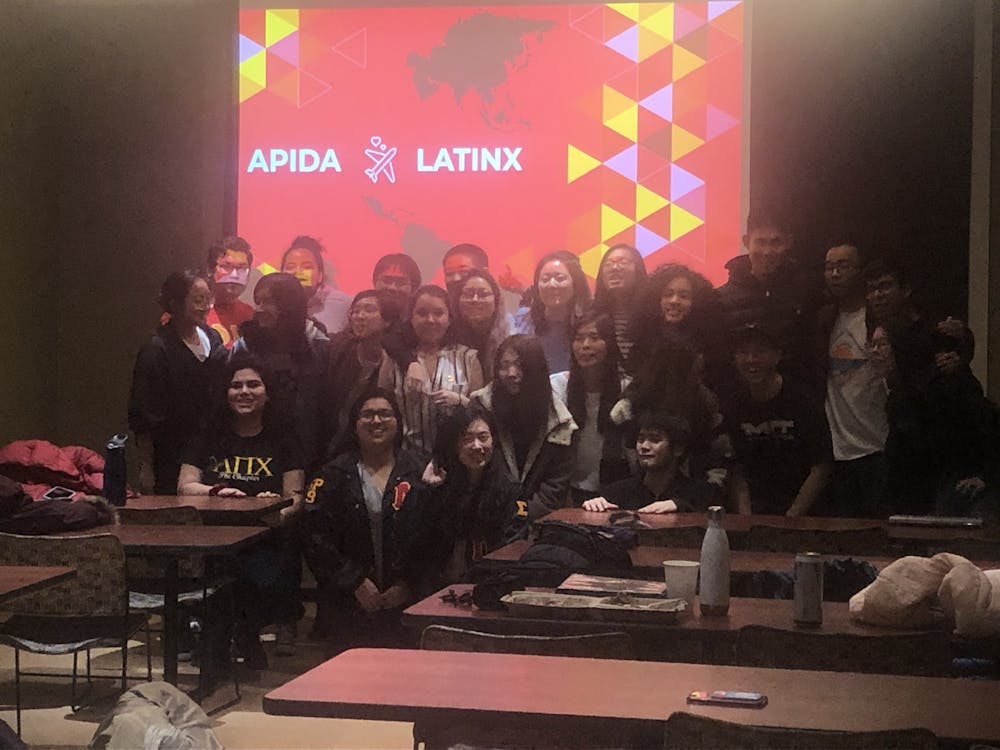The Inter-Asian Council and Latinas Promoviendo Comunidad/Lambda Pi Chi Sorority Inc. hosted an event between the Asian Pacific Islander Desi American (APIDA) and Latinx communities on Tuesday. These groups convened to facilitate a conversation led by group speakers about the overlap and interaction between APIDA and Latinx identities.
Senior and President of Lambda Pi Chi Isabel Siordia began the event by giving an overview of the ways in which APIDA and Latinx cultures have interacted with each other in the U.S.
Siordia cited the farm labor movement in Hawaii and resistance to laws restricting non-citizens’ land ownership rights as instances where APIDA and Latinx communities worked together in the early 20th century. She noted that these two communities also collaborated in the late 20th and early 21st centuries to support the DREAMer movement and to fight discrimination in education.
After Siordia established this historical context, two student speakers shared more about their specific identities as Latinx and Asian students.
Junior Nancy Kang explained what it was like for her, as a Chinese woman, to live in Costa Rica for 10 years. She described the complications she faces when trying to define her identity.
“Saying, ‘I’m from China,’ created an instant support network for me at Hopkins,” she said. “Even though I was living in a new country, city and school, I still connected to hundreds of people through this.”
Furthermore, Kang explained her views on how this tight-knit network produces a safe space for international students. However, at Hopkins she finds that there are often differences in national and cultural identity between domestic and international students.
Kang spoke about the hardships she finds in defining her Costa Rican heritage.
“Saying, ‘I’m from Costa Rica,’ feels like a lie. I identify more with Latin American culture than the country itself. My classmates were from surrounding countries, so I was exposed to a medley of other cultures,” she said.
Kang described her appreciation for the Costa Rican lifestyle, which she believes is oriented around freedom and friendliness.
“I picked and chose from a culture how it benefited me,” she said.
This semester, Kang has made a point to learn more about the Latinx community. She joined Baila!, a group which aims to empower Latin American students through dance. Baila! provided her with a cultural connection that she was missing at Hopkins.
The next speaker, sophomore Isaiah Gerardo, spoke about his experience growing up in Mexico as a boy with a Mexican mother and Afro-Puerto-Rican-Japanese father.
Gerardo explained the complicated relationship he had with his Asian identity. He did not have much opportunity to learn about Japanese culture while growing up in Mexico, but he tried to learn about it in school.
“Passing as Asian gave me privilege in school and at the border crossings,” Gerardo said. “Teachers would assume that I was giving answers to my sister in school.”
After the speaker presentation, the attendees watched a brief excerpt from the Japanese documentary Chicano. Chicano culture refers to Mexican American culture commonly found in Los Angeles. The documentary shown depicts the application of this culture in Japan.
After viewing the clip, attendees discussed whether it was a form of cultural appropriation. Some believed that people often exemplify the Chicano culture without truly understanding it. Others held the belief that culture is meant to be spread, authenticity is ever-evolving and that these people do not seem to be looking down or commercializing.
To wrap up the event, the groups facilitated a discussion on family dynamics, mental health and socioeconomic status. Attendees discussed their personal experiences and how they contrasted across cultural lines. There were instances of overlap when group members discussed the female and male gender roles in Latinx and Asian families.
Senior Julia See, one of the organizers of the event and a board member of Lambda Pi Chi, explained her motivation for coordinating it in an interview with The News-Letter.
“There isn’t that much solidarity between the APIDA and Latinx communities on campus. Both groups have problems internally connecting everyone because these are such broad umbrella terms,” she said. “It is important to come together outside of your affinity group and to reach out and build solidarity with other communities.”
See believes that the Asian and Latinx communities have much in common.
“I wanted to show that there are lots of similarities between the two cultures that people don’t think about,” she said. “People share the same stories and backgrounds, but people mostly focus on the differences.”





